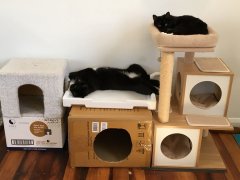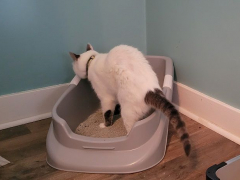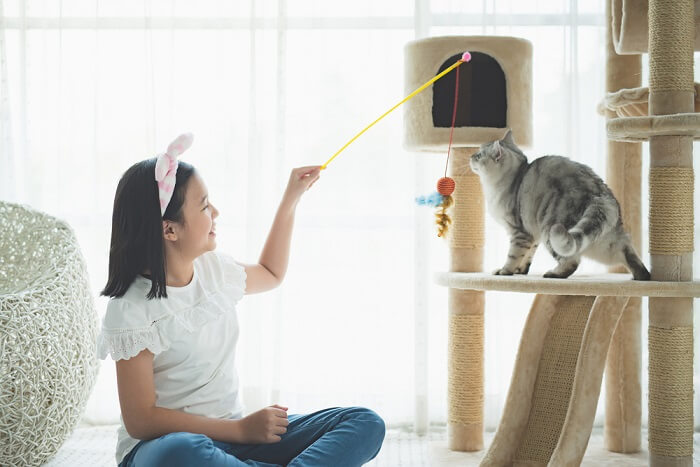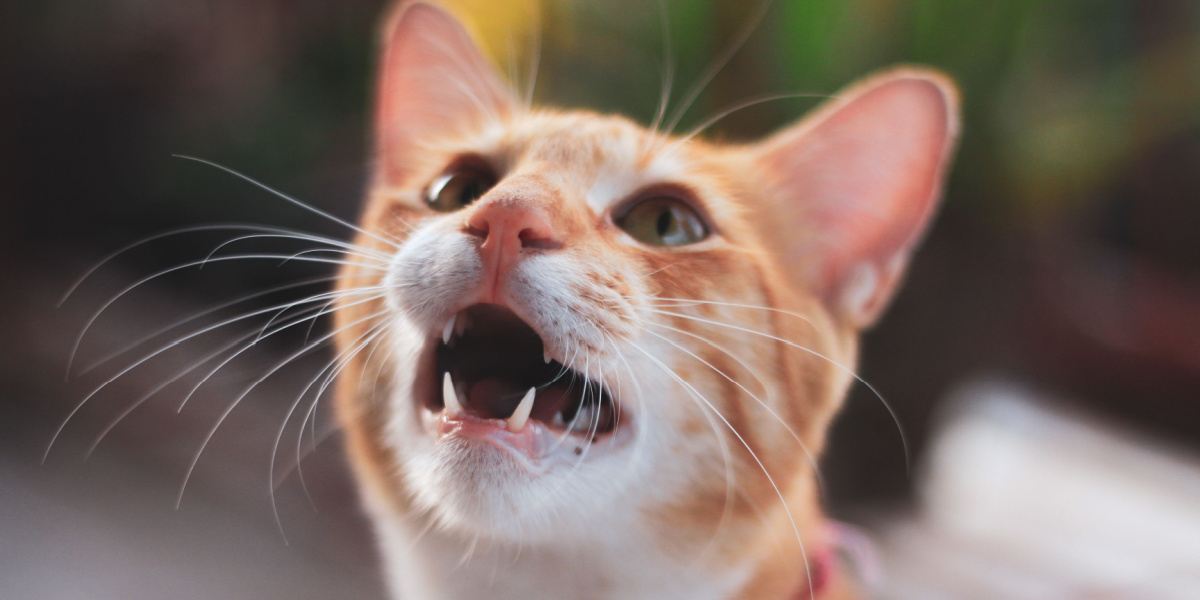
Domestic cats have a variety of vocalizations at their disposal: a loving purr, a friendly chirp, or even angry yowling. Cat sounds have different meanings, but are usually fairly easy to interpret, especially when assessed in context with cat behavior and body language. But do all cats meow? And is it a cause for concern if your cat doesn’t meow but only squeaks?
Key Takeaways
Cats are all individuals, and some make different vocalizations than others.
Some cats never learn to meow, and instead use squeaks, purrs, trills, and chirps to communicate vocally.
If your cat has suddenly started squeaking instead of meowing, there might be a medical concern, so you should seek veterinary attention.
To know if you need to be concerned, you must first determine if the squeaking sound is a new change from your cat’s usual meow sound, or whether this is normal for them. Read on to find out more about a cat’s vocal cords, what cat squeaks might mean, and when you might need to act.
Also Read: How Do Cats Communicate With Each Other? A Veterinarian Explains
What Is A Meow?
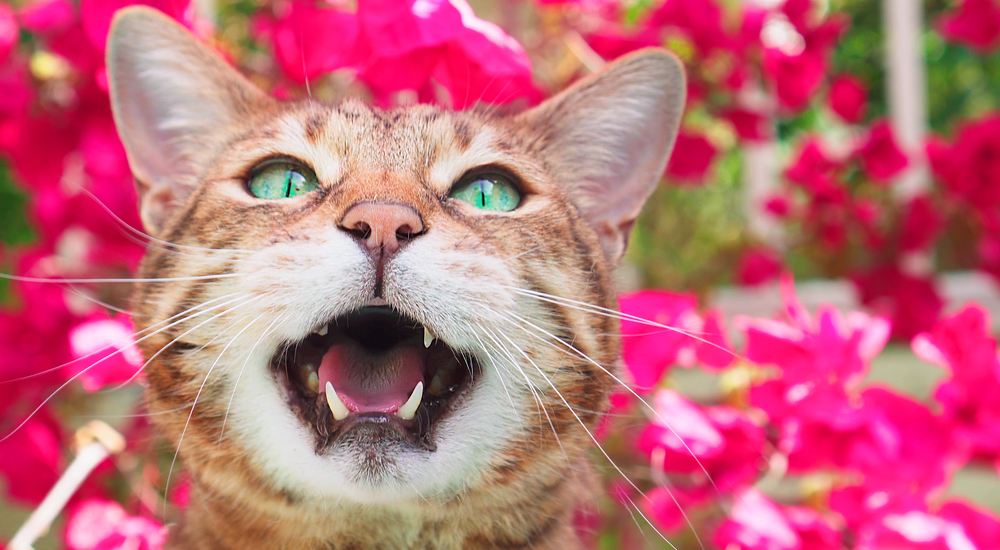
Cats only use a meow to communicate with humans, not other other adult cats.
The meow is an interesting cat sound, as it is used to communicate with people rather than other cats. Mother cats will respond to a kitten’s meow, but older cats don’t meow at each other at all. Your adult cat might use the meow sound with you as a greeting, a means of soliciting attention or food, or to let you know if they need you.
Also Read: When A Cat’s Meow Sounds Strange (Hoarse Voice)
What Is A Squeak?
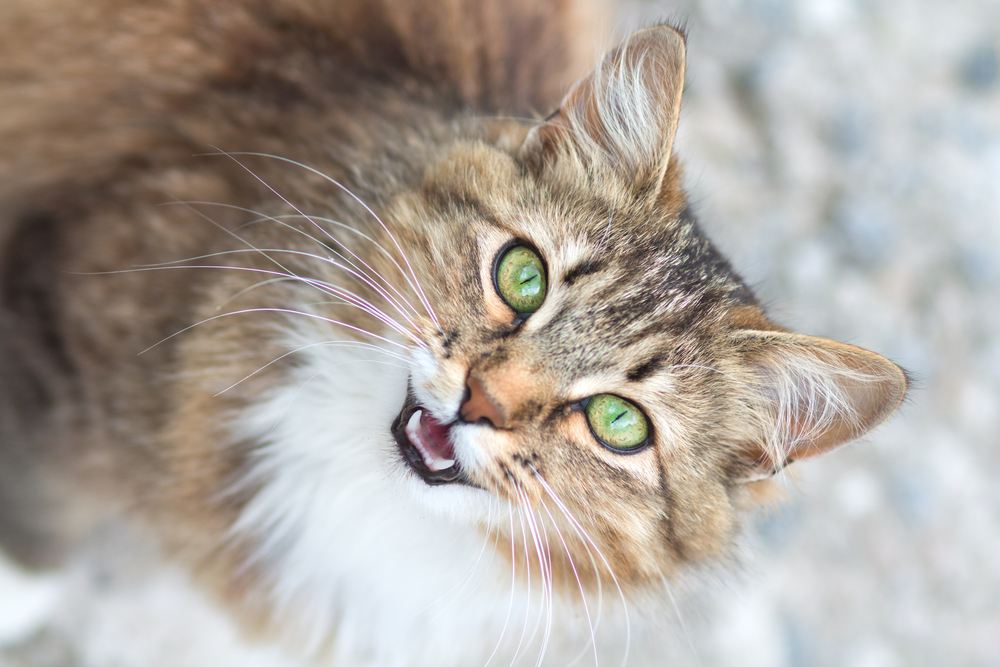
Most cat use sounds like squeaks and chirps more often than meows.
A soft squeak, chirp, or trill is actually a much more natural cat sound than a meow. A short, high-pitched “peep” noise is used by mother cats to get her kittens to return to her, by kittens and adult cats during playtime, when excited or happy, when watching potential prey, or to get another cat’s attention.
Also Read: 12 Signs Of An Extremely Happy Cat
Why Doesn’t My Cat Meow?
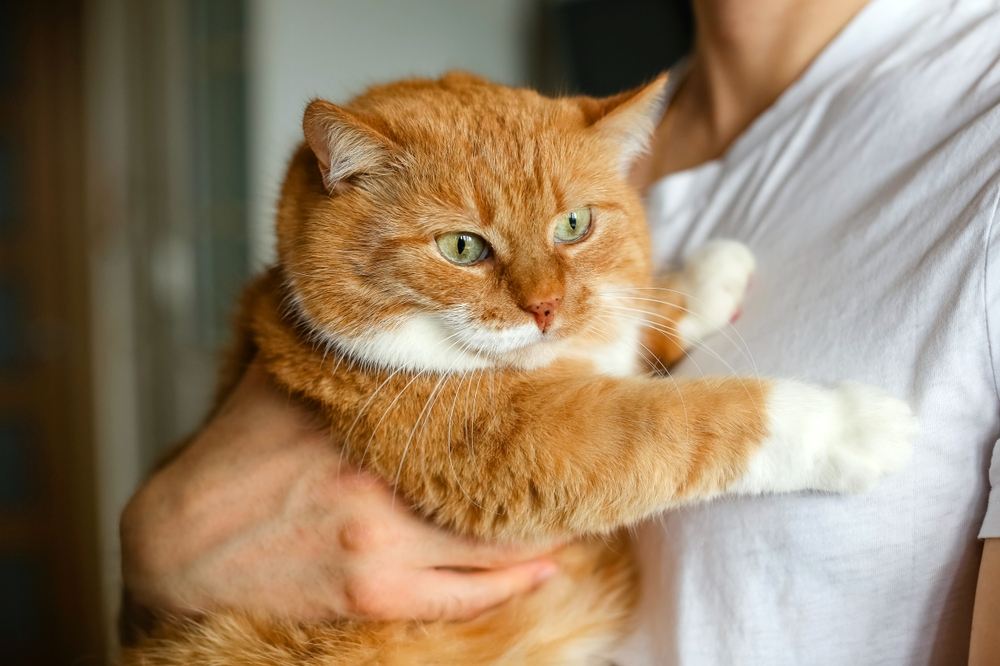
If your cat has always meowed, but suddenly only squeaks, it could be a symptom of a medical issue.
If you don’t hear your cat make the distinctive meow sound, there is an important distinction to make: Have you ever heard your cat meow? If your cat doesn’t normally meow, this might be perfectly normal for them.
However, if your cat used to meow at you but now can only squeak, this might indicate a medical problem. If you have a new cat, it can be hard to make this distinction, but listen carefully to your cat’s communication for clues as to what their usual preferences are when it comes to vocalization.
Also Read: Why Do Cats Howl? A Veterinarian Explains
My Cat Has Never Made A Meow Sound
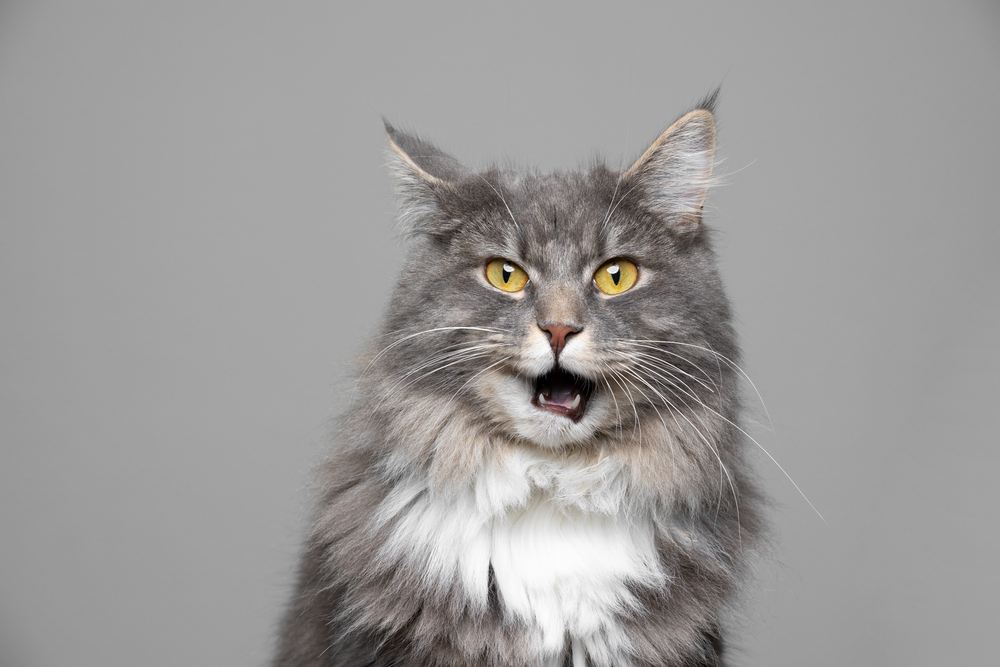
If young cats aren’t exposed to adult cats meowing, they never learn how to make the sound.
If your cat has always squeaked rather than meowed, this might be perfectly normal for them! There are a few reasons some cats just don’t meow:
- They never learned: Cats are taught to meow, often by their mothers, or by hearing adult cats interact with humans. If they have never learned the meow sound, they will never use it. This is most common in feral cats, so if you have an adopted stray cat that never meows, they might have never learned how.
- They’re naturally quiet: All cats are different! Some cats are very chatty, and others are much quieter. Some prefer purring or squeaking to meowing, and some refrain from vocalizing much at all. Some individual cat breeds are known for their talkative natures—the Siamese springs to mind.
- Defective vocal cords: Rarely, cats are born with a birth defect that affects their vocal cords and the range of noises they can make. This is very uncommon and unlikely to cause any problems if only their vocalizations are affected. Cats can communicate in many other ways and are unlikely to be particularly held back by this issue.
Also Read: The 10 Sounds Cats Love Most
My Cat Use To Meow And Now Just Squeaks
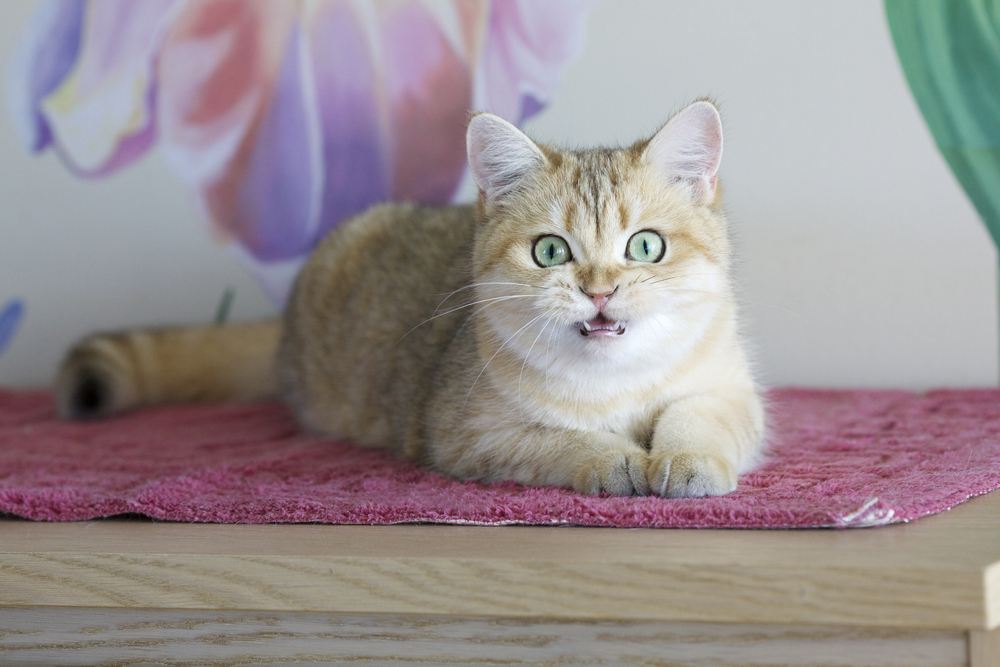
Certain medical conditions can affect a cat’s voice, causing them to squeak rather than meow like normal.
Cat owners are usually well attuned to changes in their pet’s habits. If your cat’s vocalizations have changed, this might be cause for concern. They might have stopped meowing, or their voice might have changed, and they can now only seem to squeak.
Multiple medical conditions can affect your cat’s voice. If you have noted altered vocalizations in your cat, seek veterinary advice. Your vet might also ask about the other symptoms, such as changes to appetite or thirst, lethargy, discharge from the nose or eyes, excess salivation, sneezing, coughing, or gulping.
Here are some potential health problems that might affect a cat’s meow:
- Laryngeal problems: The larynx, or voice box, is located at the top of your cat’s throat, at the entrance to the windpipe. It is a complicated and delicate structure made up of cartilage, ligaments, and muscles. A common laryngeal disease in the cat is inflammation (laryngitis), which can be caused by irritation from dust, pollens, other airway irritants, infection, trauma blockages, and other illnesses. The larynx can also be affected by polyps, tumors, and nerve paralysis.
- Upper respiratory infection: Respiratory infections are common in cats and are often caused by viruses such as feline calicivirus or herpesvirus. They can cause changes to your cat’s vocalizations, alongside other symptoms such as lethargy, nose or eye discharge, poor appetite, and sneezing.
- Cancer: Sadly, cats can be affected by cancer, just like many other species. Internal tumors can be difficult to spot, and the only symptoms might be mild until the cancer grows very large or spreads. Any tumors around the throat, lungs, head, and neck can potentially cause vocal changes in cats. There might be other symptoms, such as weight loss or unexplained swellings.
- Breathing difficulties: Medical conditions concerning the heart and lungs can cause cats to have breathing difficulties and increased effort as they breathe. This can present as odd squeaking or roaring sounds as your cat breathes. If your cat seems to have any trouble breathing, is breathing with a lot of effort, or open-mouth breathing, seek urgent veterinary attention.
- Hyperthyroidism: A cat’s thyroid gland is located in their neck. An overactive thyroid gland (hyperthyroidism) is a common illness in older cats. The most seen symptoms include a ravenous appetite, weight loss, increased thirst and urination, and some degree of hyperactivity, but a large thyroid gland can also cause changes to a cat’s voice and sounds.
Also Read: 6 Reasons Your Cat Makes Weird Noises At Night
What To Do And When To See A Vet
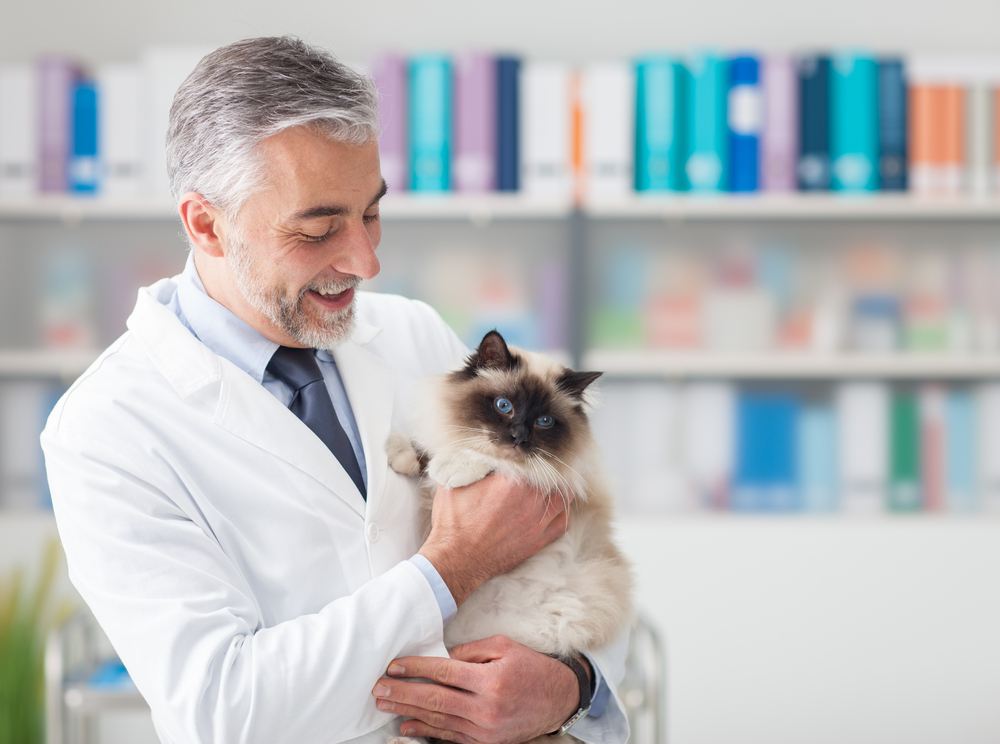
As a general rule, schedule a check up with your vet any time your cat’s behavior changes from their norm.
It can be difficult to tell if a cat that doesn’t meow needs veterinary attention. If your cat has never made a meowing sound but has a range of other vocalizations such as squeaks, chirps, and purrs, there is no need for concern. Ensure your cat is not showing signs of stress, provide all the resources they need, and continue to maintain a strong bond with them.
If your cat’s meow has suddenly changed to a squeak, or their vocalizations have become hoarse or reduced, or if they are showing other symptoms such as sneezing or discharge, visit a veterinarian. They will examine your pet and might discuss further investigations such as blood tests, x-rays, ultrasound, or CT scanning.
Also Read: 10 Subtle Signs Your Cat May Be Sick
Summing Up
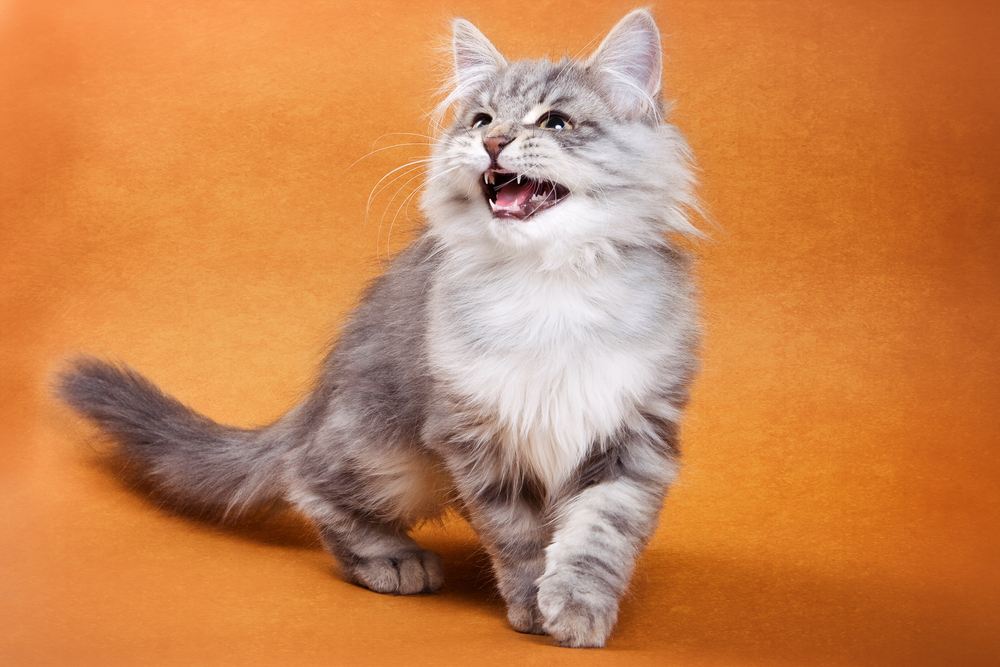
Some cats squeak or trill instead of meowing, and that can be completely normal for them.
We all get used to our individual cat’s habits and sounds: from caterwauling in the yard to purring on our laps. If your cat is naturally quiet or prefers squeaks to meows, then embrace this individuality.
If, however, your cat’s vocal sounds have changed, seek veterinary attention as this might be an early signal that something is amiss. Always keep a close eye on your cat for signs of stress, ill health, or adverse behaviors.
Also Read: 5 Visual Signs Of A Stressed Cat And How To Help
Frequently Asked Questions
Why does my cat barely meow?
Some cats are naturally quiet, and use other forms of communication such as body language and scent. If your cat was more vocal but has suddenly stopped meowing, they might have a health problem, such as a laryngeal disorder or infection, and you should see a veterinarian.
Why is my cat not able to meow?
Your cat might never have learned to meow, or might have a birth defect that makes it so they cannot produce this sound. Some cats are just much quieter than others. If your cat was able to meow but now can’t, this might be due to a medical problem such as laryngitis and you should seek veterinary attention.
What does a squeaky meow mean?
Adult cats generally use the meow sound to communicate with people rather than other cats. A squeaky, high-pitched meow is used as a form of greeting, pleasure, or in excitement during playtime. Some cats will use a squeaky meow to request something, such as attention or food.

